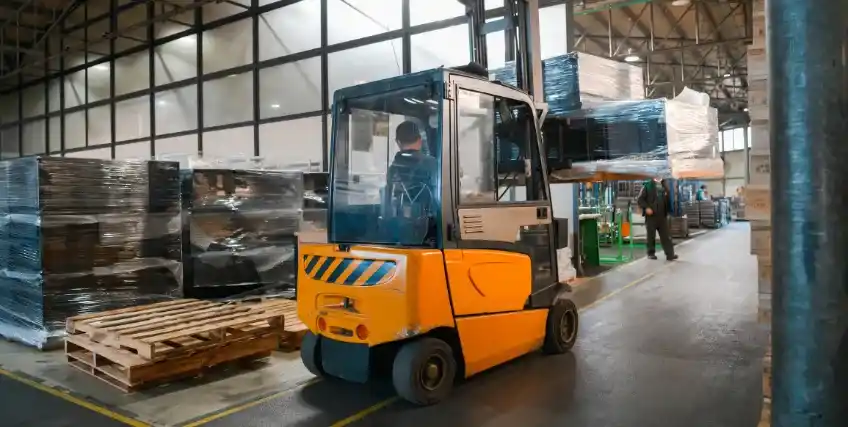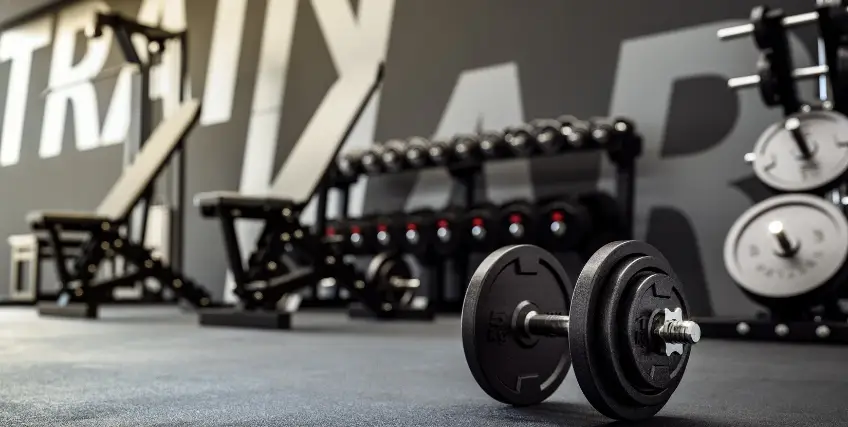Industries That Can Benefit from a Business Equipment Loan
November 13, 2025 | Last Updated on: November 13, 2025

Every growing small business needs the right equipment to grow and succeed. Whether it’s medical devices or delivery trucks, equipment keeps daily operations running. However, buying these pieces of equipment upfront can put a major strain on cash flow. However, business equipment loans help small businesses access essential tools while preserving working capital.
As technology is evolving, the need for reliable, efficient, and cost-effective equipment is more critical than ever. For businesses to thrive in competitive markets, having access to flexible and strategic business financing options is no longer optional, it’s a growth necessity.
In this article, we’ll explore the industries that benefit most from business financing for equipment. We’ll also look at how this business equipment financing solution supports growth, improves productivity, and ensures companies stay competitive in fast-changing markets.
What is a Business Equipment Loan?
A business equipment loan is a type of small business financing solution used to purchase business equipment. This small equipment financing option covers a wide range of assets such as office furniture, heavy equipment, vehicles, and even medical equipment. Here borrowers secure a specific loan amount and repay it over time, usually through monthly payments.
When compared to equipment leasing, you own the type of equipment once the loan is paid in equipment financing. This option is especially useful when the item has a long lifespan or holds its value. Additionally, it also helps to avoid larger down payments and makes it easier to manage cash flow.
Benefits of Business Equipment Loans
Securing the right business equipment loan offers multiple advantages. The first thing is that it preserves the working capital of a business. Instead of paying a lump sum, you spread the cost over months or years when seeking a business equipment loan. This helps in keeping your business banking account stable and your operations funded.
The second benefit of getting a business equipment loan is that it provides access to new equipment and technology. In many industries, outdated tools can slow your business down. Therefore, up-to-date tools help in improving performance and service.
Additionally, some equipment purchases may offer tax deductions under Section 179 in the United States. This allows business owners to deduct the full cost of qualifying equipment in the year of purchase.
Industries That May Benefit the Most from Business Equipment Loans
There are numerous industries that rely on tools and machinery to keep their operations smooth and productive. However, not all companies have extra funds to purchase equipment upfront. That’s why business equipment loans have become a valuable option.
Small business owners can spread the cost of equipment over time, to keep pace with demand, meet safety standards, and stay ahead of the competition, all without draining their budget. Here are the industries that can benefit the most from business equipment loans.
Construction
The construction sector heavily relies on construction equipment. These include cranes, bulldozers, and forklifts. These tools and machinery are essential, but they often come with high upfront costs.
Business equipment loans can help contractors get the right equipment without draining their funds. With the right loan terms, they can align loan payments with project timelines and reduce downtime. This also allows companies to bid on larger projects with confidence, knowing they have the necessary tools lined up in advance.
Manufacturing
The manufacturing industry needs updated machinery like CNC machines, 3D printers, and robotics. These tools improve speed and precision, while also minimizing errors and production bottlenecks.
Online equipment financing allows manufacturers to purchase these tools while keeping operations running. This is a solid move to manage soft costs and reduce long-term expenses. Many manufacturers find it easier to forecast returns on investment when payments are predictable.
Healthcare and Medical Services
Medical practitioners often require surgical tools and diagnostic systems, as the medical industry depends on accuracy. Equipment not only impacts the quality of care but also the patient’s experience.
Business owners can seek healthcare equipment financing and can spread out loan payments with fixed rates. This business equipment loan option ensures better patient care and compliance. Additionally, it helps facilities meet stringent safety and health regulations without overwhelming their budgets.
Agriculture and Farming
In the agriculture industry, farmers use tractors, irrigation setups, and harvesters. Instead of purchasing these pieces of equipment, they can apply for small equipment financing to match seasonal cycles.
With flexible business equipment loans, they can increase yields and reduce manual labor. It also helps manage business needs with minimal upfront investment. This kind of support is critical for farmers to stay competitive during challenging harvest seasons.
Restaurants & Hotels
Restaurants and hotels often need reliable equipment like fryers, ovens, and refrigerators. These pieces of equipment are capital intensive and play an important role in these industries.
Business equipment loans help upgrade or replace these pieces of equipment without hurting liquidity. It supports hygiene, efficiency, and growth. With consistent access to new appliances, restaurant and hotel industries can maintain quality and customer satisfaction.
Transportation and Logistics
The logistics industry typically requires trucks, GPS systems, and fuel-efficient upgrades to improve delivery accuracy. However, these pieces of equipment come with a cost.
Business equipment loans make it possible for these industries to replace or expand fleets. Moreover, equipment upgrades reduce maintenance and improve cash flow. Many companies also benefit from advanced tracking tools that improve delivery schedules and reduce fuel waste.
IT and Technology Firms
Tech firms do require servers, computers, and cybersecurity tools. As their operations expand, their equipment needs also change with time.
Using business equipment loans can help IT firms scale while meeting performance goals. These upgrades also help with remote work and data safety. In an industry where downtime can mean lost revenue, timely upgrades are non-negotiable.
Retail and E-commerce
Modern retailers use digital displays, inventory scanners, and POS systems in their industry. When sales grow, equipment needs to keep up.
Business equipment loans help maintain customer service quality. It also supports smoother transactions and inventory control. For e-commerce brands, investing in automation tools and real-time analytics can dramatically boost productivity and profits.
How to Choose the Right Business Equipment Loan
For small business owners, choosing the best lender for business equipment loans involves several steps. The first step is to start by identifying the type of equipment you need. They match your business plan and expected return on investment (ROI).
The next step is to compare interest rates, loan terms, and payment options. Some lenders may also offer lines of credit, business credit cards, or even business loan calculators to estimate payments.
The eligibility requirements for seeking a business equipment loan also matters. Lenders typically check your credit score, personal credit, annual revenue, and financial statements. Some require disclosures about subsidiaries or current business line usage.
For example, the SBA loan program offers affordable rates but has strict criteria. If you're a startup, consider alternate loan terms and online equipment financing platforms.
Common Mistakes to Avoid When Applying for a Business Equipment Loan
While business equipment loans can be a smart solution for growing companies, many small business owners make avoidable mistakes that lead to higher costs, delayed approvals, or financial strain. By recognizing these pitfalls in advance, you can secure the right loan with confidence.
Not Having a Clear Plan for Equipment Use
One of the biggest mistakes is applying for a loan without knowing exactly how the equipment will improve operations or generate revenue. Lenders want to see a clear return on investment (ROI). Without a well-defined purpose, your loan application may be weaker, or you may end up financing unnecessary or underutilized equipment.
Borrowing More or Less Than Needed
Some businesses overestimate their needs and borrow more than necessary, leading to higher debt and interest payments. Others underestimate and find themselves short on funds mid-project. It’s important to accurately calculate equipment costs (including installation, delivery, and maintenance) to avoid cash flow disruptions.
Ignoring Hidden Fees and Loan Terms
Many business owners focus only on the interest rate, overlooking origination fees, prepayment penalties, or variable rate clauses buried in the fine print. These extra costs can make a “low-interest loan” more expensive than expected. Always review the full loan agreement before signing.
Overlooking the Equipment’s Lifespan
A common mistake is financing equipment with a loan term that extends beyond the equipment’s practical use. This means paying off a loan even after the equipment is no longer efficient or suitable for business needs. Align your loan term with how long the equipment will continue delivering value.
Applying Without Preparing Financial Documents
Incomplete or missing financial documentation is a top reason for loan delays or rejections. Before applying, ensure you have updated tax returns, financial statements, proof of revenue, and business credit reports ready. Being organized speeds up approval and shows lenders you’re a reliable borrower.
Not Comparing Multiple Lenders
Some business owners go with the first lender they approach, without shopping around. Loan terms, interest rates, and flexibility vary widely between banks, online lenders, and specialized equipment financing companies. Comparing offers can save thousands over the loan’s life.
Assuming All Equipment Qualifies
Not every piece of equipment may be eligible for financing, especially used or highly specialized equipment. Failing to check with the lender beforehand could result in application denial or needing alternative financing.
Forgetting to Account for Maintenance and Upgrades
While the loan may cover the purchase price, many owners forget to budget for ongoing maintenance, repairs, or software upgrades associated with the equipment. This oversight can create unexpected costs later on.
Neglecting Impact on Future Borrowing
Taking on an equipment loan adds debt to your balance sheet, which can affect your ability to secure other financing down the road. Some business owners don’t consider how new debt affects debt-to-income ratios or future creditworthiness.
Not Considering Tax Implications Upfront
Some owners miss opportunities for Section 179 deductions or depreciation benefits by not consulting a tax professional before financing. Understanding how your loan and equipment purchase affect taxes could save you money come tax season.
Conclusion
From real estate offices to logistics hubs, every industry needs functional tools. A business equipment loan makes these assets accessible without draining resources.
If you're planning a big purchase, review your eligibility and explore equipment financing options. Moreover, choose an equal housing lender, check member FDIC credentials, and prepare your disclosures and documents in advance.
Smart equipment upgrades drive growth. Don’t delay the tools that keep your business running. Apply for the right financing today and meet your business goals head-on.
Frequently Asked Questions About Business Equipment Loans
What makes a business eligible for equipment financing?
Eligibility often depends on the company’s credit score, annual revenue, time in business, and ability to repay. Some lenders also review your business plan and financial statements before offering approval.
How do business equipment loans impact cash flow?
Business equipment loans let businesses avoid large upfront payments. By spreading costs over time through monthly payments, companies can preserve working capital and plan budgets better.
What types of equipment can be financed?
Lenders typically finance a wide range of items such as construction equipment, medical tools, office furniture, tech hardware, kitchen appliances, and more. The key is that the equipment supports business operations.
Can I finance used equipment or only new equipment?
Many lenders do offer business equipment loans for used equipment, though terms may vary. It often depends on the equipment’s condition, value, and expected useful life.
Does equipment financing include soft costs?
In some cases. Some lenders may allow soft costs like delivery, installation, or training to be included in the total loan amount. However, this depends on the loan structure.
Frequent searches leading to this page
Term Loans are made by Itria Ventures LLC or Cross River Bank, Member FDIC. This is not a deposit product. California residents: Itria Ventures LLC is licensed by the Department of Financial Protection and Innovation. Loans are made or arranged pursuant to California Financing Law License # 60DBO-35839




